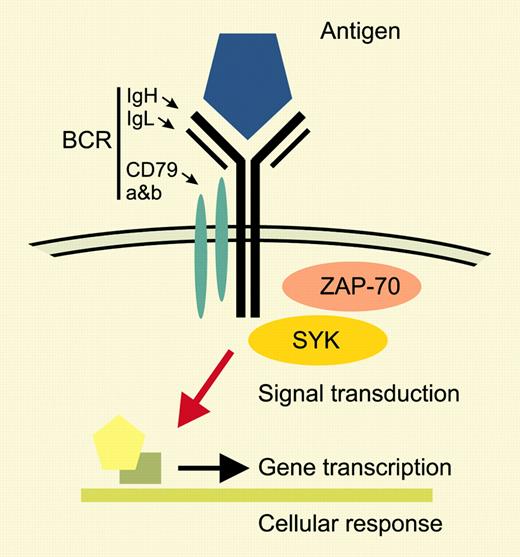Comment on Chen et al, page 2036
Antigen stimulation of the leukemic clone is increasingly implicated in the pathogenesis of CLL. Chen and colleagues provide evidence that expression of ZAP-70 in CLL B cells renders IgM signaling more effective and thereby could contribute to the more rapidly progressive clinical course of ZAP-70–positive CLL.
There is increasing evidence for a role of antigen in the pathogenesis of chronic lymphocytic leukemia (CLL), most notably the nonrandom composition of the B-cell receptor (BCR) expressed on the leukemic cells, suggesting that CLL B cells recognize distinct antigens.1 Ongoing antigen-mediated activation of the leukemic cells through the B-cell receptor is suggested by the presence of cellular activation markers on the cell surface and the expression of genes induced by BCR stimulation in at least some CLL types.2,3 Other features such as the low expression of the immunoglobulin chains on the cell surface and reduced responsiveness to immunoglobulin M (IgM) stimulation in some CLL clones are consistent with an anergic state induced by chronic antigen exposure.1 Importantly, the nature of the cognate antigen and differences in the responsiveness of the leukemic cells to antigen stimulation may explain the well-known heterogeneity in the clinical course of CLL.
Zeta-associated protein of 70 kDa (ZAP-70), a cytoplasmic tyrosine kinase essential for T-cell–receptor signal transduction, is preferentially expressed in CLL B cells whose immunoglobulin genes have not undergone somatic hypermutation (Ig-unmutated CLL), while a second CLL subtype with mutated immunoglobulin genes most often lacks ZAP-70 expression.3 Expression of ZAP-70 in CLL B cells is associated with more rapid disease progression and shorter survival4 and may be a better predictor of clinical course than Ig-mutation status.5 Whether ZAP-70 expression indicates a distinct cellular origin of the clone or different activation states of the leukemic cells remains to be determined. Chen and colleagues focused on a role of ZAP-70 in BCR signal transduction and demonstrate that CLL B cells that express ZAP-70 are more likely to respond to IgM cross-linking with increased tyrosine phosphorylation of key signal transduction proteins and increased calcium flux than ZAP-70–negative CLL B cells. By introducing ZAP-70 into ZAP-70–negative CLL cells, they could convert IgM-nonresponsive B cells to IgM-responsive cells. While this finding supports a direct role of ZAP-70 in IgM signaling, it is not evident how expression of ZAP-70 increases BCR signaling in CLL B cells, as these cells do express normal amounts of SYK kinase, the functional B-cell homolog of ZAP-70. It is conceivable, however, that ZAP-70 expression may antagonize mechanisms involved in downmodulating BCR activity in anergic B cells and thereby could facilitate BCR signaling.FIG1
Determinants of BCR signaling in CLL. BCR composed of IgH (immunoglobulin heavy chain), IgL (immunoglobulin light chain), CD79a, and CD79b.
Determinants of BCR signaling in CLL. BCR composed of IgH (immunoglobulin heavy chain), IgL (immunoglobulin light chain), CD79a, and CD79b.
The evidence implicating ZAP-70 in BCR signaling is derived from in vitro experiments using a controlled but artificial way to initiate IgM signaling. It is therefore important to test predictions of this model in vivo and to keep in mind that ZAP-70 expression distinguishes 2 CLL subtypes that differ in several respects, not the least of which may be the nature of the antigen recognized and possible differences in the interaction with nonmalignant cells and in BCR composition. All of these factors may influence the consequences of BCR engagement in vivo that can range from increased proliferation and survival to induction of apoptosis. ▪


This feature is available to Subscribers Only
Sign In or Create an Account Close Modal